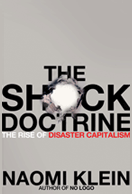The Shock Doctrine

Disaster Capitalism in Action: aig
Audit Faults Timothy Geithner and the New York Fed in A.I.G. Bailout
Mary Williams Walsh, New York Times, November 17, 2009
"The Federal Reserve Bank of New York gave up much of its power in high-pressure negotiations with the American International Group's trading partners last year, according to a government report made public on Monday....
"The New York Fed, led then by Timothy F. Geithner, who is now the Treasury secretary, therefore had little leverage in the negotiations, according to a post-mortem of what has emerged as the most inflammatory episode in the rescue of A.I.G.
"The Fed 'refused to use its considerable leverage,' Neil M. Barofsky, the special inspector general for the Troubled Asset Relief Program, wrote in a report to be officially released on Tuesday, examining the much-criticized decision to make A.I.G.'s trading partners whole when people and businesses were taking painful losses in the financial markets.
"There have been suggestions that the Fed chose to negotiate weakly, Mr. Barofsky said, to give a 'backdoor bailout' to A.I.G.’s banks. He said Mr. Geithner and the Fed’s lawyers had denied this, but added that 'irrespective of their stated intent,' there was no doubt about the result: 'Tens of billions of dollars of government money was funneled inexorably and directly to A.I.G.'s counterparties.'"
Most of AIG's $160 Billion Bailout Went to Large Banks; Firm Also Spent $165 Million in Staff Bonuses
Hugh Son and Robert Schmidt, Bloomberg News, March 16, 2009
"American International Group Inc., under pressure to reveal how it spent billions of dollars in taxpayer funds since its September bailout, said $105 billion flowed to U.S. states and banks including Goldman Sachs Group Inc., Societe Generale SA and Deutsche Bank AG. Banks that bought credit-default swaps or traded securities with AIG got $22.4 billion in collateral, $27.1 billion in payments from a U.S. entity to retire the derivatives, and $43.7 billion tied to the securities-lending program, AIG said yesterday in a statement. States led by California and Virginia got $12.1 billion tied to guaranteed investment contracts....
"The disclosure may fuel a backlash over AIG’s bailout, valued at about $160 billion as of March 2, which has already drawn expressions of anger and frustration from Congress, Treasury officials and Federal Reserve Chairman Ben S. Bernanke. AIG was lambasted yesterday for awarding $165 million in retention pay to employees of the unit that sold the swaps, deals that helped trigger the global credit crisis. AIG has said it plans to spend as much as $1 billion to keep people from leaving as it sells units....
"Goldman Sachs led beneficiaries, with $12.9 billion, followed by SocGen, France’s No. 3 bank, with $11.9 billion, and Deutsche Bank, Germany’s biggest lender, with $11.8 billion."
Bailed-Out Companies Spend Millions to Lobby Congress
Elizabeth Williamson and Brody Mullins, Wall Street Journal, January 23, 2009
"Troubled financial institutions and the Detroit auto makers continue to spend heavily on lobbying Congress while accepting billions of dollars in U.S. government money, reports to Congress suggest....
"Bank of America Corp., whose heavy losses prompted it to appeal to the government for a second bailout this month, spent $4.1 million on lobbying last year, nearly $1 million more than in 2007. The bank spent $820,000 on lobbying in the last quarter, about one-fifth less than in the third quarter. Bank of America is in line to receive a total of $45 billion from the government, including $20 billion committed by the Treasury this month....
"Congressional filings show that lobbying by American International Group, which the government took control of in September, continued in the fourth quarter, despite the government's holding 78.8% of the company. Congressional filings show that AIG spent $1.08 million in the fourth quarter. AIG's 2008 lobbying spending was $9.5 million, $1 million less than in 2007....
"In October, after the Wall Street Journal reported that AIG was lobbying states for more favorable interpretations of a law that would place new controls on mortgage originators, Sen. Feinstein and Republican Sen. Mel Martinez of Florida introduced legislation that would ban recipients of taxpayer money from lobbying. The two lawmakers are seeking sponsors for a House version of the bill."














